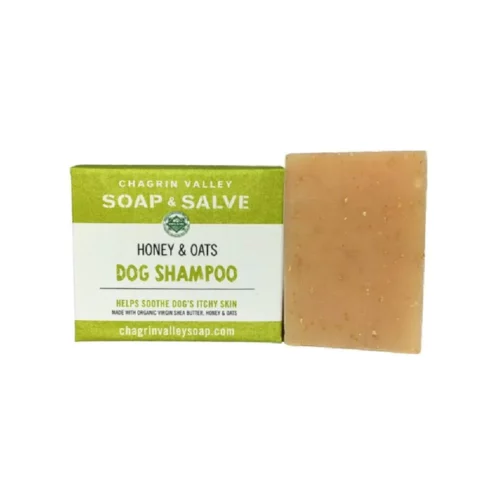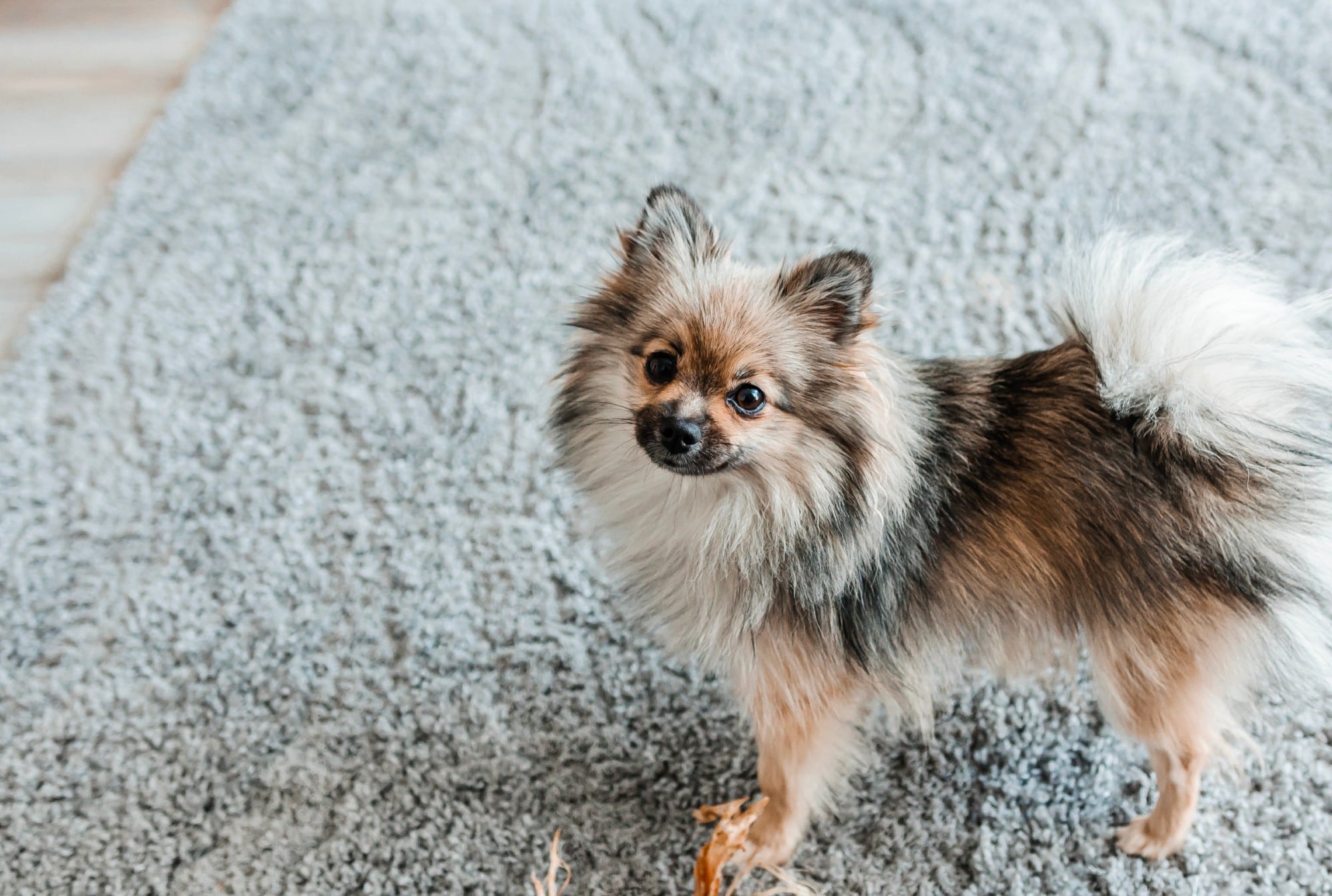This article has been updated.
When dogs have allergies, the reaction can be extreme. After all, they can’t pop a Zyrtec. They can’t decide to go for a round of allergy shots. They can’t even make the decision to stay out of the field that’s causing them to sneeze and scratch.
Genetics affects the tendency toward allergies as well as where the dog lives and what the dog eats. And a dog’s breed also has a part in a predisposition to allergies.
Related: 8 Large Breed Dogs That Don’t Shed or Make You Sneeze
There are many kinds of allergies that can affect your dog. When these allergens are inhaled or absorbed, they can trigger an immune response, causing inflammation and symptoms like skin redness, swelling, and itching.
Atopic dermatitis is an inflammatory, chronic skin disease and is caused by dogs reacting to environmental allergens. Typical sources of atopy allergies are pollen, molds, ragweed, dust mites, cigarette smoke, feathers, cleaning products, and even perfume. Allergies that result from something your dog has eaten are food allergies. There’s also allergies from flea bites called flea allergy dermatitis and contact allergies from things like carpet, plastics, and fabrics.
How Do You Know if Your Dog Has Allergies?
Allergies tend to develop between the ages of 6 months and 3 years, but it can happen later (or earlier) in life, depending on various factors.
In order to help your dog, you have to recognize the symptoms that indicate he’s suffering from allergies. These include:
- Increased scratching
- Constant licking
- Itchy, red, moist skin
- Itch, runny eyes
- Chewing at the feet
- Scratching or rubbing the face
- Itchy back or base of tail
- Sneezing
- Diarrhea
- Vomiting
- Hair loss
- Hot spots
- Ear infections
If your dog has any of these symptoms, start by taking him to your veterinarian, as allergies can be hard to diagnose. Allergy testing is similar to tests done on humans: substances are introduced into the skin just below the surface to see if there’s a reaction and rule out other conditions. There are also blood tests, like RAST, which can help determine environmental allergens. Food allergies are tested by giving your dog a prescription diet for a few months to rid the system of allergens and then reintroducing foods to see which one she reacts to.
Treatment for Allergies
The best treatment for allergies is prevention.
Once you figure out what the offending culprit is, remove it from your dog’s environment or diet.
If you suspect food allergies, your vet may recommend food trials, either changing up the diet, removing ingredients from the diet, or putting your dog on a prescription diet to determine the culprit. The top food allergies are chicken, wheat, beef, lamb, and dairy. By having a restrictive diet, a study found that in 80% of the cases the dog achieved remission within five weeks, and by increasing it to eight weeks, it jumped to 90%.
For flea and tick allergies, be rigorous about monthly medication. Not only can it help with allergies, but also prevent diseases. For insect allergies, use pet-friendly repellents and use outdoor solutions to keep these pests away.
If your dog is allergic to indoor allergens like dust, wash his bed weekly and vacuum your home at least twice a week. Bathing once a week will remove environmental allergens and pollen from his skin. (Prescription shampoos can cut down on bathing if it dries out your dog’s skin.)
Made with finely ground oats, honey, and cornstarch, the shampoo bar soothes dry skin while adding shine and moisture to the coat.
Supplements are another option to help control allergy symptoms, improve your dog’s overall health, and boost the immune system.
Some dogs may be helped by antihistamines like Benadryl or Chlor-Trimeton. There are also treatments using steroids, corticosteroids, and allergy shots. Your vet will be able to provide the best plan for your dog.
Bye Bye Shabby Coat nourishes your dog’s skin and coat from the inside out. Veterinarian formulated and using powerful natural ingredients, including healthy omegas, salmon oil, and vitamin E, our chews help heal dry, itchy, irritated skin, while also promoting a shinier and softer coat. All our supplements are proudly manufactured in the USA.
Here are 10 breeds that are prone to allergies
While any dog can develop allergies, certain breeds are more likely to develop them due to genetic predisposition, skin characteristics, and the thickness of their fur.
Here are the top breeds that are more likely to develop allergies (in alphabetical order).
1. American Pit Bull Terrier 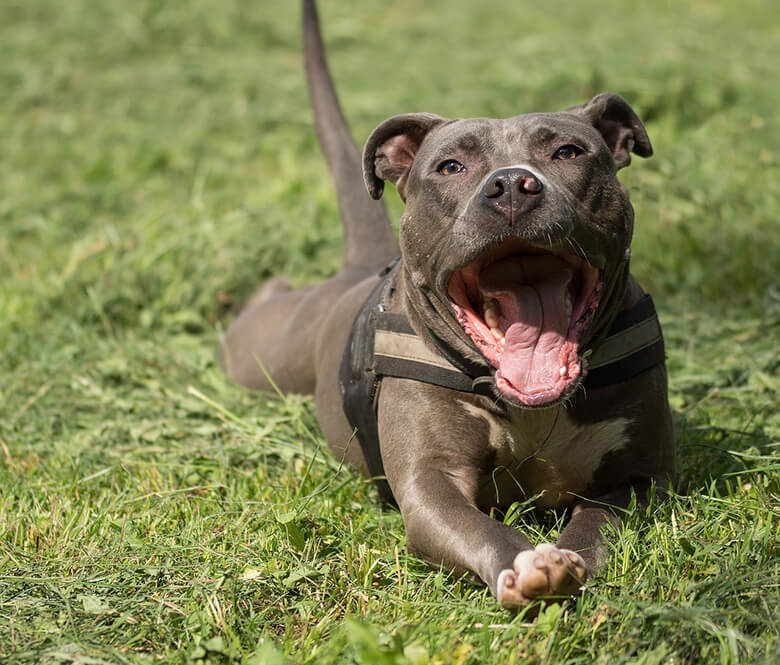
Allergies are common in the American Pit Bull Terrier, along with other stocky, square-head dogs that fit under the “pit bull” umbrella, including the American Staffordshire Terrier, Staffordshire Bull Terrier, American Bulldog and American Bully. Their short coat makes them susceptible to environmental allergens, like grass, dust, pollen, pesticides, and mites. Without the protection of fur, these allergens can cause itchiness and zinc-responsive dermatosis, which results in redness, crusting, and oozing of the skin.
2. Bichon Frise
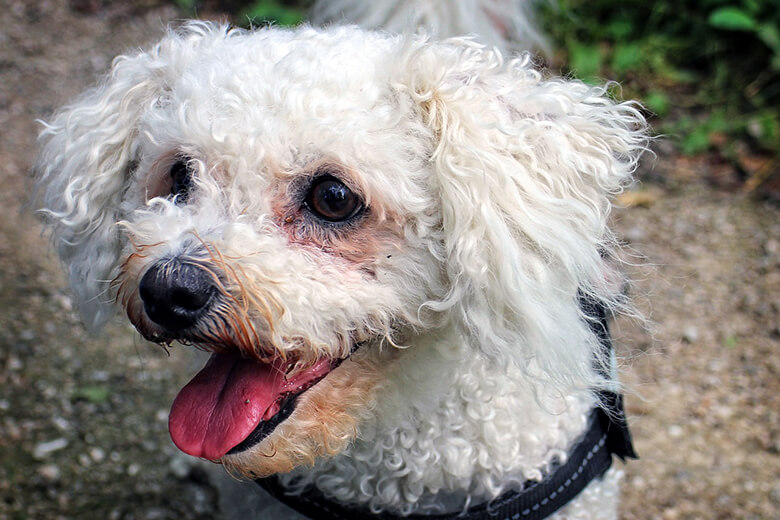
Despite being considered a hypoallergenic breed for humans, Bichon Frise are prone to allergies. The most common allergies for the Bichon Frise are contact allergies that cause skin problems along with food allergies. They are also sensitive to flea bites and airborne allergens from grass, flowers, trees, pollen, and dust.
3. Boxer

The Boxer is a breed more prone to food allergies due to genetics. They tend to be sensitive to dog food with a high grain content, including corn or wheat. The Boxer’s coat, susceptible to oiliness, can cause an unpleasant odor along with itchy, flaky skin and inflammation.
4. Brussels Griffon

Skin allergies are at the top of the list for Brussels Griffon. Areas most affected are the feet, belly, folds of the skin, and ears. Watch for licking of the paws, rubbing the face, and frequent ear infections. Allergies manifest early, from 1 to 3 years, so be on the lookout.
5. Bull Terrier
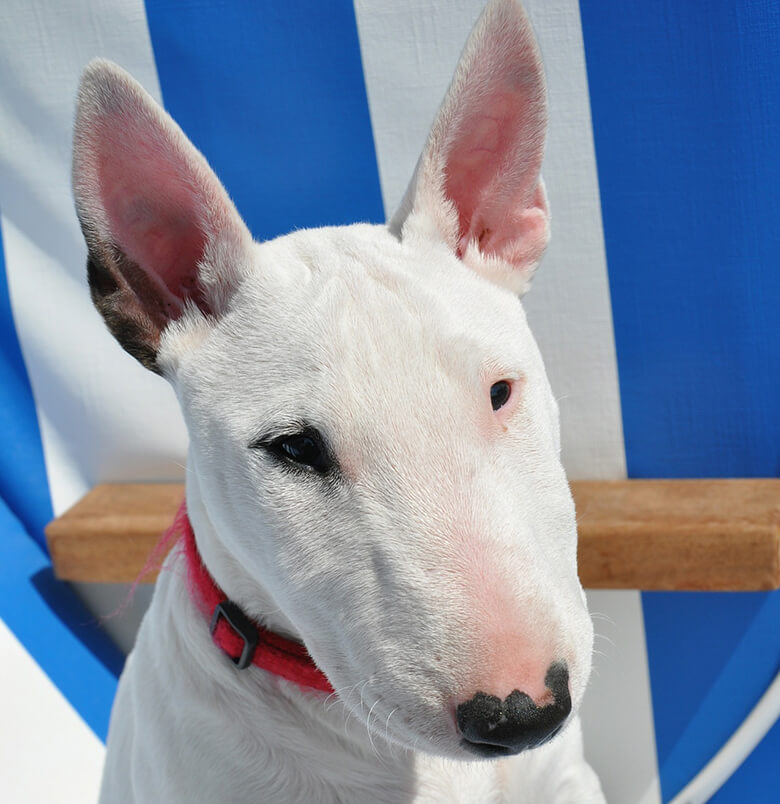
Sensitive skin, contact allergies, and allergens inhaled such as detergents, chemicals, pollen, dust, and mildew are the most common allergies for Bull Terriers. An allergic skin disease called atopic dermatitis that causes itching, irritation, infection, and discomfort is prevalent.
6. Cocker Spaniel

The three most common allergies are food, contact, and inhalant allergies, with the latter being the most common. Allergies manifest typically as itching in the ears and feet of Cocker Spaniels. Allergies to typical inhalants like pollen and materials like wool, plastic, copper, synthetics, and sand are common.
7. German Shepherd
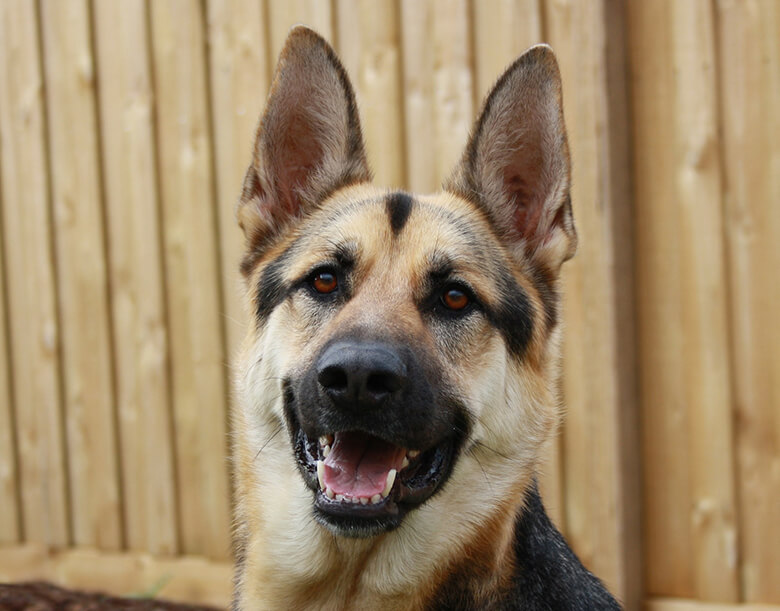
The German Shepherd is considered a high-risk breed for skin allergies, which can be triggered by contact with parasites, environmental factors, like pollen, dust, and pesticides. The breed is also known for its food sensitivities. Symptoms include sores, dry, flaky skin, itchiness, and possible secondary bacterial infections.
Related: 5 Medium-Sized Dog Breeds Who Are a Blessing for Those With Allergies
8. Golden Retriever 
There are four major forms of allergies for the Golden Retriever: flea, canine atopic dermatitis, food, and contact. Allergies in Golden Retrievers have a strong genetic component, according to research. Because of their double coat, it can be hard to detect symptoms, like hot spots, flaky skin, and inflammation. Irritants that affect the skin include pollen, dust, fleas, mold, grasses, and weeds. Common food allergies are soy, wheat, dairy, beef, and some poultry.
9. Labrador Retriever

Common allergies for Labrador Retrievers include food, flea, contact, bacterial, and inhalant allergies that manifest most frequently as skin problems the skin. Food allergies are triggered by common dog food ingredients like soy, eggs, beef, corn, fish, and chicken.
Similar to the Golden Retriever, it has been found that Labrador Retrievers are genetically predisposed to allergies, with some reports believing it is because they produce higher quantities of immunoglobulin E (IgE). Allergens provoke an immunoglobulin E response, which releases histamines, causing irritation and inflammation. Common allergies for Labrador Retrievers include food, flea, contact, bacterial, and inhalant allergies that manifest most frequently as skin problems.
10. Maltese

The top signs of allergies in the Maltese are itching, rash or irritated skin, thinning hair, wheezing, and eye, nose or ear issues, and can be caused by environmental factors and contact. Food allergies can also manifest as gastrointestinal problems.
Recognizing and managing allergies in your dog plays a pivotal role in maintaining their overall health and happiness. Dog parents can ensure their furry companions live fulfilling lives by remaining attentive, consulting with veterinarians, and employing suitable measures to address allergic reactions.
Related: Our Favorite Products to Help Dogs Who Suffer From Summer Allergies














